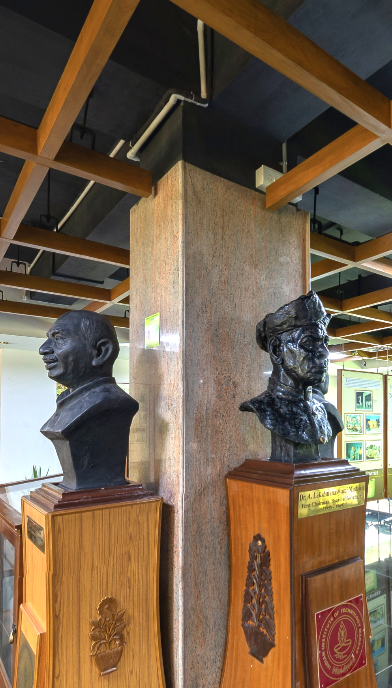Rotary Drum Granulator
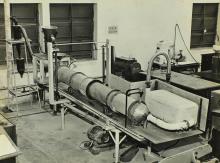
- Photographs , Equipment , 1970s
Seen in the image is a rotary drum granulator which was photographed at the department of Chemical Engineering. The machinery is used to granulate fine powdery materials (eg. Fertilisers) with simultaneous drying, to give free flowing property. Provision exists to study the effect of the variables like inclination, speed of the drum, feed rate and air temperature during granulation.
Smoke nuisance test on model of ‘State of Bombay’
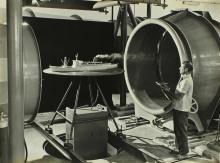
- Photographs , Equipment , 1970s
The ‘State of Bombay’ was a passenger vessel built in 1975 by Mazagon Dock Limited (Mumbai, India). Its gross tonnage was 9500 tons. The current status of the ship is: Decommissioned or lost. The image shows a smoke nuisance test being carried out on a model of the ’State of Bombay’ by the Department of Applied Mechanics at IIT Madras. The test was carried out in a 1.5m diameter test-section of the closed-circuit, low-speed wind tunnel. The tunnel was capable of a maximum speed of 60m/s and was provided with a semi-automatic six-component balance. The gentleman in the image has been…
Supersonic Wind Tunnel
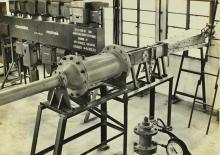
- Photographs , Equipment , 1970s
A supersonic wind tunnel is a wind tunnel that produces supersonic speeds (1.2<M<5). The Mach number and flow are determined by the nozzle geometry. The Supersonic Wind Tunnel seen in the image is a blow down intermittent type with a run time of 30 seconds. The size of the wind tunnel is 100mm × 100mm and has an operating range of Mach numbers of 1.5 to 3 in steps of 0.25. The equipment was photographed at the Department of Aeronautical Engineering, IIT Madras. Similar photographs can be found in album 0334: 001/0334/IMG_105792 & 001/0334/IMG_105793
Fluid sand process
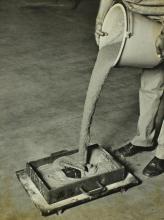
- Photographs , Equipment , 1970s
Seen in the image is a process called the fluid sand process which was developed at IIT Madras using indigenous materials for making moulds and cores for the production of ferrous and non –ferrous castings of high dimensional accuracy. As part of the process, sand is mixed suitably with a binder and a foaming agent (promotes the formation of bubbles). The mixture has considerable fluidity and can be directly poured into a mould and core boxes without compaction. No drying is necessary before casting.
Filament wound tubes under test
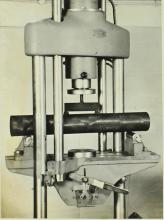
- Photographs , Equipment , 1970s
IIT Madras set up six centres in the year 1973. The Composite Structures (FRP) Research Centre, also known as the Fibre Reinforced Plastics (FRP) Centre, was one of them. The Centre was officially opened in March 1974 and it aimed at co-ordinating and utilising its expertise and resources to advance the special areas of technology that was of national importance. It also aimed at providing technical advice and leadership to the FRP industry in the country. The key objectives of the Centre and services offered included: Research and development of raw materials and composites, process design…
Diffusion and oxidation facility for fabrication of MOS transistors and integrated circuits
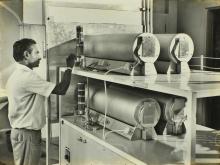
- Photographs , Equipment , 1970s
Seen in the image is a facility for diffusion of impurities into silicon and for growing different types of silicon dioxide layers on silicon surfaces that was set up in the department of Electrical Engineering for the fabrication of MOS Field Effect Transistors, MOS Integrated circuits and other semiconductor devices. The person in the image is yet to be identified. A similar photograph can be found in album 0329: 001/0329/IMG_105825
Rotary Drier
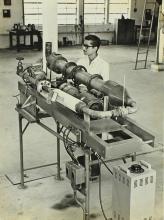
- Photographs , Equipment , 1970s
Seen in the image is a rotary drier that was fabricated by Hindustan Photo Films, Ooty for the purpose of drying silver nitrate. The drier was photographed in the Department of Chemical Engineering at IIT Madras where it was used to study the drying characteristics of crystalline and hydrated salts without cake formation which affects both heat and mass transfer.
Microwave parabolic antenna
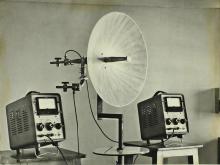
- Photographs , Equipment , 1970s
An antenna was made using Fibre Reinforced Plastic (FRP) by the FRP Centre at IIT Madras. The Composite Structures (FRP) Research Centre, also known as the Fibre Reinforced Plastics (FRP) Centre was started at IIT Madras in March 1974. It was started due to the increased use of FRP, on a global scale, for advanced technology applications as well as for commercial and domestic applications. Prior to the formation of the Centre, in 1960, research and development activities in this area was initiated by the Department of Aeronautical Engineering (IIT Madras) because of the possible and…
Microwave Interferometer
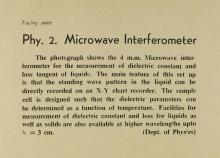
- Photographs , Equipment , 1970s
The image describes a 4mm microwave interferometer for the measurement of dielectric constant and loss tangent of liquids. The equipment was photographed at the department of physics. The main feature of this set up is that the standing wave pattern in the liquid can be directly recorded on an X-Y chart recorder.
Research centrifugal Fan Impeller
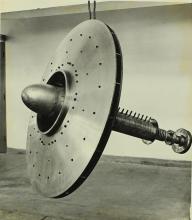
- Photographs , Equipment , 1970s
Seen in the image is a research centrifugal fan impeller that was designed by the Department of Mechanical Engineering, IIT Madras. The centrifugal fan is designed to produce 3600m3/hr of free air at 400 mmWc running at 1500 rpm and operates at an efficiency of 68%.
Supersonic Wind Tunnel
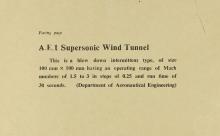
- Photographs , Equipment , 1970s
A supersonic wind tunnel is a wind tunnel that produces supersonic speeds (1.2<M<5). The Mach number and flow are determined by the nozzle geometry. The Supersonic Wind Tunnel described in the image is a blow down intermittent type with a run time of 30 seconds. The size of the wind tunnel is 100mm × 100mm and has an operating range of Mach numbers of 1.5 to 3 in steps of 0.25. The equipment was photographed at the Department of Aeronautical Engineering, IIT Madras.
Solar water heater
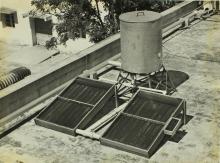
- Photographs , Equipment , 1970s
Seen in the image is a solar water heater that was made by the Department of Mechanical Engineering. The water heater had the capacity of 200 litres with auxiliary electric heating. The maximum temperature of the hot water in the storage tank was around 60°C to 70°C. The overnight drop in temperature was observed to be 6°C to 8°C.
Universal Bearing Testing Machines
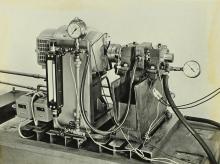
- Photographs , Equipment , 1970s
Universal bearing testing machines are used to study journal bearing performance. The image shows a universal bearing testing machine used by the Department of Applied Mechanics in IIT Madras. The following are the specifications of the machine: Speed range 300-4500 r.p.m. and lubricants used – Oil (Newtonian and non-Newtonian), grease and gas.
Extrusion in an Hydraulic Press
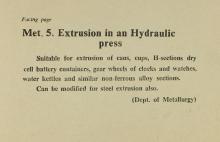
- Photographs , Equipment , 1970s
The image describes the application of extrusion in a hydraulic press at the Department of Metallurgy, IIT Madras. Extrusion in a hydraulic press is suitable for extrusion of cans, cups, H-sections dry cell battery containers, gear wheels of clocks and watches, water kettles and similar non-ferrous alloy sections.
Surface Pyrometer
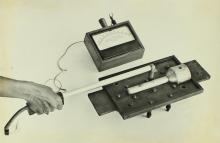
- Photographs , Equipment , 1970s
A pyrometer is a device that used to measure the surface temperature of an object without touching the object’s surface. Seen in the image is a surface pyrometer that was fabricated by the Department of Metallurgy at IIT Madras. This surface pyrometer is used to measure the surface temperatures of dies for gravity and pressure die castings, pattern plates of shell moulds, punches and dies of metal forming pressures and cast iron and other steel plates pre-heated for welding. It has two ranges: 0°C to 250°C and 0°C to 500°C with an accuracy of 2°C.
- Contribute
to the Centre -
Monetary
Support - Digital
Material

